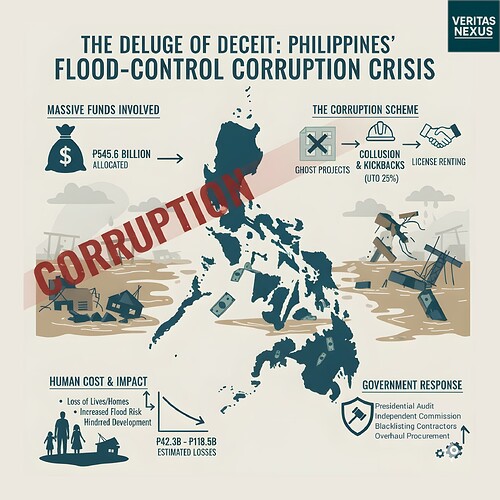Flood-Control Corruption Crisis
The Philippines, an archipelago nation perpetually vulnerable to the wrath of typhoons and the devastating consequences of flooding, is grappling with a crisis that extends beyond the natural elements. A significant portion of the funds meticulously allocated for flood mitigation projects, intended to safeguard lives and livelihoods, is being siphoned off by systemic corruption. This “deluge of deceit” not only cripples the nation’s ability to cope with disasters but also compounds the suffering of its most vulnerable communities.
The Staggering Scale of Betrayal
The numbers paint a grim picture. From July 2022 to May 2025, a colossal 545.6 billion (approximately US$11.08 billion) was earmarked for flood control initiatives. However, the Department of Finance estimates that between 42.3 billion to 118.5 billion (about US$2.08 billion) has been lost to “ghost” flood control projects in just the past two years. This translates to an alarming waste of public funds, money that could have built robust infrastructure, relocated at-risk communities, and implemented effective early warning systems.
Investigations by the Senate Blue Ribbon Committee have unearthed disturbing details, revealing that kickbacks and -commissions can devour as much as 25% of a project’s cost. This leaves a paltry 30-40% for actual construction, inevitably leading to substandard work that crumbles under the slightest pressure, or worse, projects that exist only on paper.
The Mechanisms of Corruption
The corruption is multifaceted and deeply entrenched:
“Ghost” and Substandard Projects: The most egregious form involves projects that are entirely fictitious or so poorly constructed they offer no real protection. These become deathtraps for communities in the path of floods,
Contractor Monopolies: A startling revelation is that a mere 15 out of 2,409 accredited contractors were awarded the lion’s share of contracts, amounting to roughly 100 billion. This concentration of power raises serious questions about fair bidding processes and suggests possible collusion.
“License Renting”: To circumvent regulations and secure contracts, larger, accredited contractors reportedly lease their licenses to smaller, often unqualified builders. This practice inevitably leads to shoddy workmanship and compromises the integrity of flood control structures.
A Syndicate of Collusion: The corruption is not an isolated act but is believed to involve a sophisticated network comprising contractors, high-ranking officials within the Department of Public Works and Highways (DPWH), and even political figures in both the Senate and House of Representatives. This intricate web makes accountability a formidable challenge.
The Human Cost: A Man-Made Tragedy
The impact of this corruption extends far beyond financial losses. It manifests as a “human-made tragedy,” directly contributing to the devastating effects of floods. When embankments fail, waterways remain clogged, and drainage systems are inadequate due to stolen funds, communities bear the brunt. Lives are lost, homes are destroyed, livelihoods are shattered, and the country’s -development is significantly hampered. The emotional and psychological toll on flood-affected populations is immeasurable.
The attempted bribery of a congressman by a DPWH district engineer-caught offering P3.2 million for a share of flood control projects-underscores the brazenness of these illicit activities. Public outrage is palpable, with multisectoral groups, business associations, civic organizations, and church leaders vehemently demanding swift action and accountability.
What Should the Government Do?
Addressing this deeply rooted problem requires a comprehensive, multi-pronged approach from the government:
-
Swift and Transparent Investigations: President Marcos Jr.'s directive for an audit and the creation of an independent commission is a crucial first step. This commission must be genuinely independent, adequately funded, and empowered to conduct thorough investigations without fear or favor. Its findings must be made public, and those found culpable, regardless of their position, must face the full force of the law.
-
Overhaul Procurement Processes: The current system is clearly vulnerable. The government must implement stricter, more transparent, and digitally-enabled bidding and awarding processes. This includes:
Public Scrutiny: All contract details, including winning bidders, project timelines, and budget breakdowns, should be publicly accessible online.
Strengthened Due Diligence: Rigorous background checks on contractors, their track records, and financial capacities are essential.
Ending "License Renting: Strict penalties must be imposed on contractors engaging in or facilitating “license renting.”
- Enhance Oversight and Monitoring:
Independent Project Monitoring: Beyond internal DPWH oversight, independent third-party entities (e.g., academic institutions, civil society organizations) should be engaged to monitor project implementation from start to finish. Citizen Participation. Empowering local communities to actively participate in monitoring flood control projects in their areas can serve as a powerful deterrent against corruption.
Geotagging and Satellite Monitoring: Utilizing technology like geotagging for project sites and satellite imagery can provide real-time verification of construction progress and existence.
- Strengthen Whistleblower Protection: Individuals who expose corruption within the system often face intimidation and retaliation. A robust whistleblower protection program, offering both anonymity and legal protection, is vital to encourage more individuals to come forward, 5. Promote Accountability and Integrity within DPWH:
Internal Reforms: The DPWH must undertake significant internal reforms, including a review of personnel, a culture of integrity, and clear ethical guidelines.
Regular Lifestyle Checks: Implementing regular lifestyle checks for officials involved in project procurement and implementation can help detect unexplained wealth. Blacklisting Fraudulent Contractors: The Public Works Secretary’s vow to blacklist fraudulent contractors must be strictly enforced, ensuring they are permanently barred from participating in government projects.
- Invest in Sustainable Flood Solutions: While addressing corruption in existing projects, the government must also shift towards more sustainable, nature-based flood control solutions where appropriate, alongside engineered structures. This includes reforestation, wetland preservation, and improved urban planning.
The fight against flood-control corruption is not merely an economic battle; it is a moral imperative. The lives and safety of millions of Filipinos depend on the government’s unwavering commitment to stamping out this “deluge of deceit” and ensuring that every peso allocated for protection truly serves its purpose. Only then can the Philippines build a more resilient future against the twin threats of natural disasters and man-made greed.
